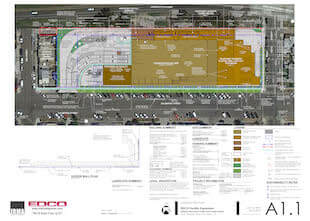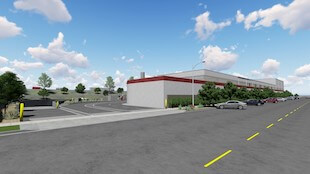Public Facilities
EDCO Recovery & Transfer
3660 Dalbergia Street, San Diego
On the Road the Zero Waste
Family owned and operated EDCO has operated EDCO Recovery & Transfer (ER&T) since 1995. Located at 3660 Dalbergia Street in San Diego, the facility operates under Barrio Logan Permit (BLP) / Coastal Development Permit (CDP) 99-0280 as amended in 2003 under CDP 8488 and Site Development Permit 8489.
The facility also operates under a Facility Franchise Agreement with the City of San Diego and since 2002, ER&T has paid over $3,000,000 in fees under this Agreement, including over $1,200,000 to a special dedicated EDCO Community Fund and $1,800,000 to the General Fund. The City controlled EDCO Community Fund has supported such worthwhile as the installation of lights at Willie Parker Field and the construction of the Memorial Skate Park. It is important to note that the funds must be invested within the broader designated geographic area surrounding the facility.
ER&T is currently permitted to accept up to 1,500 tons per day (tpd) of Municipal Solid Waste (MSW) from a combination of permitted haulers, contractors, and public self-haulers. The facility can accept material Monday-Saturday from 6:00 a.m. up to 7:00 p.m. and is the only permitted transfer station in the City of San Diego.
In addition to BLP/CDP land use entitlements and the Facility Franchise Agreement, ER&T also operates under Solid Waste Facility Permit (SWFP) #37-AA-0105 as issued by the City of San Diego Local Enforcement Agency (LEA). As such, the facility is subject to monthly inspections to determine regulatory compliance to State minimum standards in a number of areas.
While the facility has a number of regulatory oversight in place, the operations are fairly basic. Simply put, MSW is delivered to ER&T and subsequently transferred within 48 hours to a final disposal site, such as the Miramar Landfill.
As material is delivered to ER&T, a manual separation of materials (as allowable) is conducted prior to transfer of the material to a designated landfill. These include materials such as large pieces of concrete and wood. In addition, materials that are delivered to the facility separated, such as wood, green waste, and drywall are captured in segregated bunkered areas prior to transfer to a designated recycling facility.
With the approval of the Climate Action Plan (CAP), the City of San Diego has taken a leadership role in developing strategies to effectively deal with Greenhouse Gas Emission reduction targets. Included among the five strategies of the CAP is Zero Waste, a City Council approved plan to achieve 75% landfill diversion by 2020, 90% by 2035 and Zero Waste by 2040.
In response, EDCO is proposing a number of facility enhancements designed to achieve these ambitious goals through the creation of additional processing infrastructure. As such, EDCO has developed a plan to process the existing MSW within the existing daily tonnage limit of ER&T.
As the attached draft Site Plan reflects, this includes, but is not limited to, the following:
- Increase the current building size
- Install a mechanized processing line to recover commodities otherwise bound for landfills
- Install an Anaerobic Digestion (AD) facility to create Renewable Natural Gas (RNG) or electricity
- Expand the site footprint into the recently acquired property to the Project North and closing the alley adjacent to I-5
- Install a loading dock for the movement of recycling commodities
- Enhance existing traffic flows with additional on-site scales.
- Re-locate the existing office structure
- Allow for internal processing up to 24 hours per day
- Allow for acceptance of materials on Sunday, offsetting the Sunday closure of the Miramar landfill effective October 2018
- Installation of enhanced engineering controls for storm water treatment
With the exception of including Sunday operations and adding employees, ER&T is not proposing a daily tonnage or daily traffic increase to accommodate these investments and the facility will still operate within the 1,500 tpd capacity. These enhancements are strictly an effort to assist in achieving the Zero Waste goals of the City.
Material will be received, loaded onto one of two infeed conveyors and travel through various sorting stations to recover by commodity type. Anticipated recycling to be recovered includes cardboard, mixed paper, mixed rigid plastics, steel, concrete, wood and green waste.
As sorted, these commodities would remain in bunkers below the system until they are either based and shipped (cardboard, mixed paper, mixed rigid plastics) for shipment or loaded out through the transfer loadouts (concrete, asphalt, etc.). Residue material would be transferred back to the sorting floor for loadout to a final disposal site.
The AD facility offers the opportunity to take organics currently in the stream and make either RNG or create electrical power. By capturing food waste and green waste that currently enters the facility and placing the material into a dedicated chamber, the methane can be harnessed and create suitable energy for either powering vehicles or creation of electricity to power the site.
Due to site constraints, one key element of the proposed plan involves the City of San Diego vacating the existing alley at the east side of the project site, abandonment of utility easements within vacated alley (sewer, water, storm drain, gas, and SDGE). Similar former alleys on either the north or south side have already been vacated decades ago and the alley is not used as a travel lane.
As a result of the significant investment involved as well as the site constraints, the Master Facility Plan involves several phases. This allows for both economic factors, as well as continued operation during construction, as follows:
- Phase One – Loadout Tunnel, Employee Support & Site Improvements
- Phase Two – Building Expansion and Line Installation
- Phase Three – Anaerobic Digestion
EDCO looks forward to enhancing the Zero Waste capabilities of the existing site and expanding our contribution to the City of San Diego Climate Action Plan.
 3D Animated Tour
3D Animated Tour- Site Plan

- Elevations

- 3D Visuals

- Contact Us